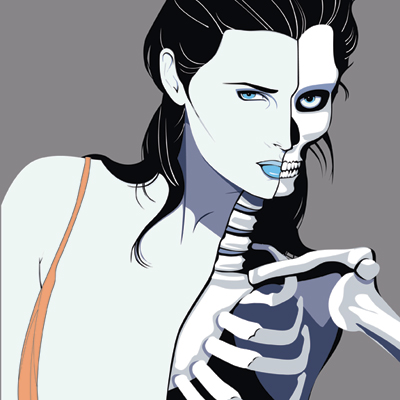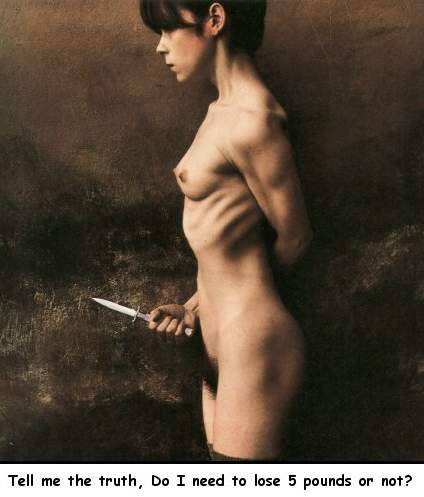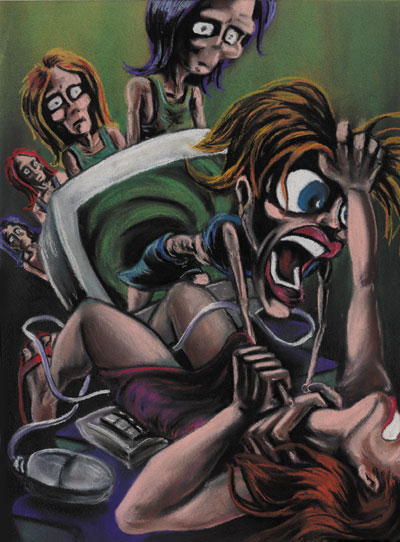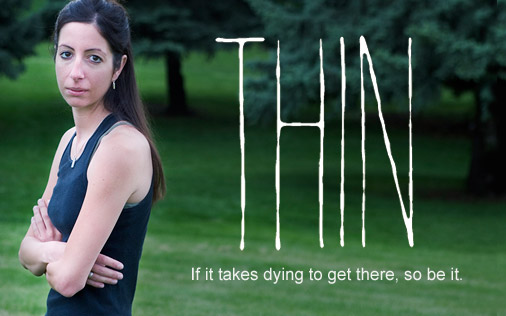| Thinspiration Sickspiration
The Health eZine - Eating Disorders
Thinspiration SickspirationBy Victoria Van Dyke My message to anorexics out there: You're fooling yourself if you think that's sexy. Yes, you might be able to attract a man who is into the whole skin and bones look, but seriously consider what kind of man he will be? Namely an asshole who will treat you like shit and flush you down the toilet the first chance he gets. And it won't be just one man who does it. It will be a long line of men who will treat you like shit and abandon you. All that proves is that the type of man who goes for anorexics is also the type of man who will abuse you and abandon you. You're not the light of his life. He doesn't love you. You're just a trophy to place on his wall and to flaunt amongst his friends. Sometimes you might meet a guy who is nice, but only because he pities you. Pity and concern for your health. He will try to change you and help you gain weight, but does he really love you for who you are? Maybe. He's the nice guy, the kind of guy you could stay with and raise kids with (assuming you want kids). Being anorexic and finding Mr Right is like trying to win a swimsuit contest while being obese. Good luck.
Then there are anorexics out there online who are promoting anorexia as a lifestyle. The Pro-Ana Movement actively promotes people to become anorexic by giving tips on how to starve yourself. These are not diet tips. They are starvation tips. And the trick I think people are often missing is that starvation eventually leads to death. There is a slew of health problems (I won't go into the boring details) and eventually the person dies of heart failure. But its the sheer gall of these people who are pushing anorexia as a lifestyle that scares me. Its like convincing people to commit suicide and to ruin their lives. As an anorexic what kind of job can you get? A model? A prostitute? Your health will get so bad that you can't work because you're sick most of the time. Being so thin lowers your immune system and makes you more likely to get sick regularly. So yes, it is a lifestyle choice. A choice to ruin your life.
Debating Eating Disorders on YouTubeYouTube has given everyone with a video camera a place to be seen and heard. And somehow, since its inception two years ago, the website has lured the secretive world of eating disorders onto its world stage. YouTube broadcaster Carolyn, 29, who asked that her last name not be published, has been locked into a 24/7 battle with her body for 17 years. She's bulimic, sometimes purging several times a day or severely restricting her food. At one point her 5-foot-4, frame carried just 83 pounds. Since last year, Carolyn has broadcast 24 videos about her disease from her home in Montreal, under the user name "chanceoperations." The blog has more than 150 subscribers. "I wanted to try and find a voice," she says of her public effort to help herself, and others, sort through their eating disorders. "It's hard when you see somebody who is struggling. You feel the same helplessness somebody would feel toward you." A 2001 study published in the Canadian Medical Association Journal says 27 per cent of Ontario girls aged 12 to 18 were "engaged in severely problematic food and weight behaviour." The site also references a 2000 study, published in the American Journal of Psychiatry, that estimates 8 per cent of North American women suffer from either anorexia nervosa or bulimia. On YouTube, the "pro-ana" movement, which stands for pro-anorexia, gets a lot of heat. Members maintain their disease is a choice; some call it their lifestyle. Pro-ana communities on myspace.com offer pep talks, diet tips and forums to discuss the disease. There are those who believe the virtual network encourages recovery, but Carolyn's blog does not support the pro-ana movement or encourage similar behaviours. Pro-ana websites popped up a few years ago, but were often shut down over concerns that the content glamorizes eating disorders. Hand in hand with pro-ana is the "Thinspiration" movement, videos of stick-thin celebrities or regular girls displaying protruding bones in their backs and hips – inspiration to starve in a flashy package. "Somebody who would promote a message like that is somebody who is in the stage of their illness where they are still taking a lot of pride in it," says Jacqueline Carter, staff psychologist with the Eating Disorders Program at Toronto General Hospital. People with anorexia tend to be ambivalent, seeing the pros and cons of the disease, she says. Addressing ambivalence in therapy is part of recovery. But as videos promoting extreme thinness only represent one side of the coin, Carter says she can't imagine how they could be helpful. As well, she notes, there is a huge irony in how individuals associate skeletal bodies with self-esteem. "It's hard to feel good about yourself when you are starved and obsessed with food and can't work because you are too sick," she says. Treating psychological problems, such as eating disorders, with professional help over the Internet, is a new field, says Carter. She believes it could be a great way of helping people who are not close to treatment services. But what's happening on YouTube could push people in either direction. "The medium itself could potentially be very helpful – but it also has the potential to be quite destructive," she says.
Sharon Hodgson, a recovered anorexic living in Halifax, N.S., agrees. "It's really a grey area because you can make friends with people doing damage to themselves and not realize how their patterns will influence your behaviour," she says. Hodgson used to moderate a pro-ana website. In 2006, she created webiteback.com to normalize recovery, and says people who think anorexia is a quick fix to lose weight aren't familiar with the true face of the disease. That face is Gillian, a YouTube user who has battled anorexia for 13 years, since she was 11. Unable to eat solid food for three years, she's fed through a tube in her nose. Her weight has dropped to as little as 49 pounds. Carolyn doesn't want to put a rosy face on her illness. She avoids doctors and dentists, partly because of the expense, so she doesn't know the exact toll on her body. "I do know my teeth are chipped and eroded and discoloured," she says. "Every now and then my heart flutters, and my hip bones crack, and I can't digest food properly." But, she says, the psychological impact is crystal clear. Carolyn describes her university degree as a waste since she now struggles to socialize. Focusing her mind on everyday concepts and activities is difficult. YouTube, she acknowledges, is an outlet and a way to connect with people.
|




|



